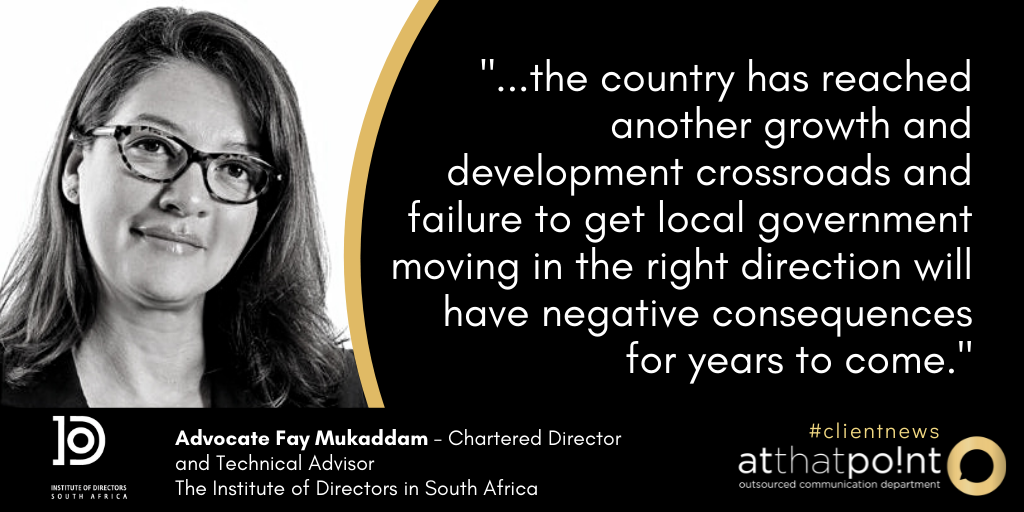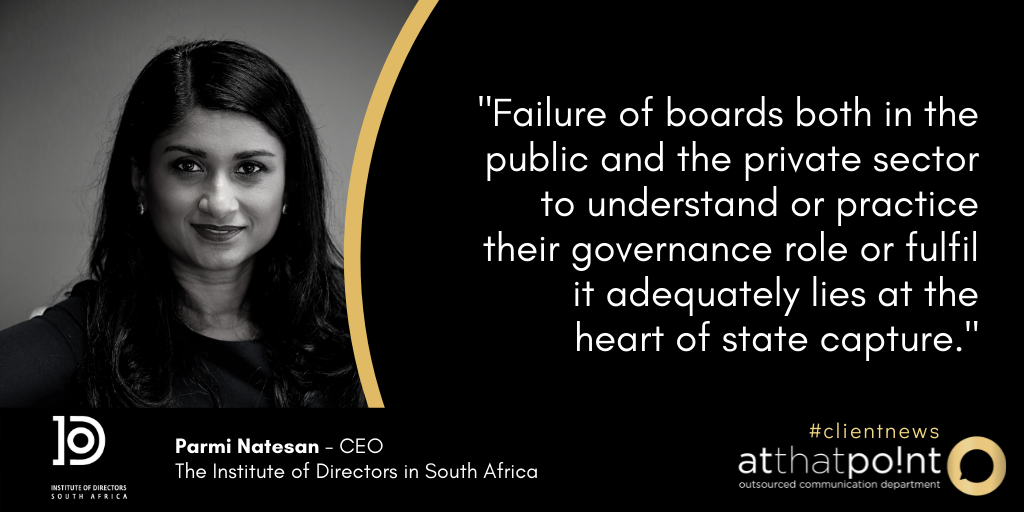 THE upcoming local government elections are unquestionably one of the most important in South Africa’s recent democratic history and the Institute of Directors South Africa (IoDSA) joins a widespread call to urge voters to turn out in their numbers. The Institute’s CEO Parmi Natesan says, “There is sufficient evidence to suggest that many municipalities in South Africa are either failing or close to a state of complete collapse. Poor service delivery has a direct impact on jobs and sustained growth and its only through the ballot box that people can make their dissatisfaction heard and to effect change where necessary.” From a governance perspective, the voters are, after all, key stakeholders in these entities and thus need to hold the leadership to account. According to the office of the Auditor General, less than 40 of the country’s 278 municipalities are said to be on a sound financial footing and should this trendline continue the risk to investment will continue unabated as well as putting increasing strain on the national fiscus as well as South Africa’s sovereign risk. Fay Mukaddam, a governance specialist with the IoDSA notes, “There is no doubt that the country has reached another growth and development crossroads and failure to get local government moving in the right direction will have negative consequences for years to come. And it’s at this level where the crisis is most pronounced. If a municipality is unable to effectively offer the most basic of services, there is an immediate negative sentiment created and this has rapid knock-on effect on the creation of new jobs.” A case in point says the IoDSA was the recent case of dairy company Clover’s decision to relocate its cheese factory from the town of Lichtenburg in the Ditsobotla Municipality due to poor service delivery for number of years. Over 400 – permanent and temporary - jobs were lost which could have been saved had there been more attention focussed on basic issues like garbage disposal and road maintenance. The Institute says for business to remain focussed and competitive; it must have a constant symbiotic and trusting relationship with local government and part of the compact is making sure a sustainable operating environment is delivered all year round. Mukaddam says while the Clover example was a high-profile and well documented issue, there are many other businesses in South Africa that are experiencing similar frustrations and that the November 1 election can be a time for businesses to send a clear and unambiguous message to failing municipalities that they have run out of runway. The IoDSA says it also acknowledges that poor service delivery and inefficient municipalities cannot be an overnight fix and that current problems are in many cases historical. Part of the dilemma according to the Bureau for Economic Research at Stellenbosch University lies with mangers and staff who often lack technical insight; and in the way that tender specifications are drawn up. An additional problem is that many smaller and poorer municipalities do not have a proper tax base. Natesan concludes, “We acknowledge these are deep-rooted problems which result daily in poor management of operational budgets; a failure in many cases to spend capital budgets as well as wasteful and irregular expenditure. And while change might occur at the political level, that doesn’t mean that problems like this will disappear immediately. There is also a vital need for functional and effective change at the governance and administrative level but that the November 1 poll is the starting point.” ENDS MEDIA CONTACT: Idéle Prinsloo, 082 573 9219, [email protected], www.atthatpoint.co.za For more information on the IoDSA please visit: Website: www.iodsa.co.za Twitter: @The_IoDSA LinkedIn: Institute of Directors in South Africa Company Page
0 Comments
BODY CALLS FOR PROFESSIONALISATION OF DIRECTORSHIP, IMPROVEMENTS TO NOMINATIONS PROCESS AND MANDATED GOVERNANCE TRAINING FOR NATIONAL LEADERS.
The Institute of Directors South Africa (IoDSA) has sent a comprehensive list of recommendations to the Zondo Commission on how to improve directorship in the country. In a detailed eight-page letter to the Commission CEO Parmi Natesan tells Deputy Chief Justice Raymond Zondo that testimony before him strikingly demonstrated how important a role directors play in creating and maintaining well-governed organisations and how dire the consequences can be if they do not appropriately discharge this critical responsibility. She says a failure of boards both in the public and the private sector to understand or practice their governance role or fulfil it adequately, lies at the heart of state capture. Natesan is hoping the IoDSA recommendations form part of the final report which was due out in October before a request for a three-month delivery extension. Natesan tells the Commission there are two key issues preventing effective governance in South Africa. One is the process for nominating board members is not transparent and is a particular challenge in the public sector but also evident in the private sector. Secondly, she says, many people lack specialised skills and knowledge needed to discharge the duties of a modern-day director. The IoDSA says the country urgently needs to reverse the current tide of corruption to secure its future and in that respect, leaders need to be accountable for their actions and a means found for removing transgressors from office. Among the key recommendations made to the Commission is bolstering the current legislative framework which she says is currently fragmented. Part of a new integrated framework would include continuous professional development. She also calls for the enforcement of a statutory body for directors including a license to operate, like most other professions. The IoDSA is also recommending to the Zondo Commission that it stipulates a consistent and transparent nomination process for directors in which a nominating panel made up of key stakeholders is stipulated. The body is also calling for the establishment of a constitutional means of alternate dispute resolution that would facilitate prompt and effective consequence management for directors who transgress or for those applying lax oversight. The Institute is also asking the Zondo Commission to recommend uniform governance training for national leaders in both the public and the private sector. Notes Natesan, “Many members of institutions do not fully understand the nature of governance role they are expected to play. A key issue is the imperative to distinguish between party political and other stakeholder interests and the best interests of the organisation in question. It would be ideal if MP’s state functionaries and office bearers in political parties were also mandated to receive focussed training. Our country’s as well as our corporations’ leaders need to know what is required of them” Natesan says the recommendations to Justice Zondo are made in a positive and constructive spirit and in the best interests of ridding South Africa of its entrenched culture of malfeasance, given that many citizens have lost faith in societal institutions and are looking to the Commission for recommendations that will indicate how those who abuse their positions are held to account. ENDS MEDIA CONTACT: Stephné du Toit, 084 587 9933, [email protected], www.atthatpoint.co.za For more information on the IoDSA please visit: Website: www.iodsa.co.za Twitter: @The_IoDSA LinkedIn: Institute of Directors in South Africa Company Page |
Archives
July 2024
Categories
All
|


 RSS Feed
RSS Feed